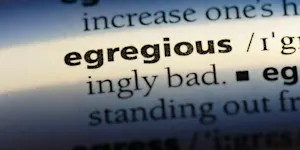What Makes This Word Tick
Misgiving carries an air of unease, like a gentle nudge from your intuition warning "something's amiss." It's the shadowy cousin of doubt, whispering in the background when you're about to make a decision. You might not always know why it's there, but you feel it, like a hesitancy that can't be ignored.
If Misgiving Were a Person…
Misgiving would be that wise but slightly worrisome aunt who always raises an eyebrow at your bold choices. She's not negative, just cautious, always ready with a "have you thought about...?" as you set off on a new adventure. Though she might shake her head, you know she’s got your best interests at heart.
How This Word Has Changed Over Time
Over time, misgiving hasn't strayed far from its original roots. It's always been about that uncomfortable gut feeling, though once upon a yesteryear, it might have found itself more at home in ghost stories or tales of treachery. Today, it's just as likely to pop up when you're deciding whether to eat that questionable expiration date yogurt.
Old Sayings and Proverbs That Use Misgiving
There aren’t too many ancient proverbs starring misgiving, but it's a concept that echoes in folksy warnings like "Better safe than sorry." These phrases remind us that a little hesitation now can save a lot of trouble later.
Surprising Facts About Misgiving
Did you know that "misgiving" is quite the blending of linguistic heritage? The term comes from Middle English, with "mis-" signaling error or wrongness, and "give," suggesting a granting of feeling. Together, they craft a very particular brand of uncertainty.
Out and About With This Word
You might encounter misgiving at a family gathering when someone suggests playing charades, or during those tense moments in movies just before a character opens a creaky door. It’s a universal theme, speaking to our shared human experience of doubt and caution.
Pop Culture Moments Where Misgiving Was Used
Misgiving sneaks into pop culture during those nail-biting thriller plots or reality show twists where contestants must decide to stick with their choice or swap. It's the flavor of suspense that hooks viewers right before the commercial break.
The Word in Literature
Authors love a good misgiving to thread tension through their narratives. In mystery novels, it's often the little birdie on a detective's shoulder, hinting they’ve missed a crucial clue. Classic literature, too, uses it to make heroes pause and reconsider their paths.
Moments in History with Misgiving
One might imagine misgivings clouding the minds of explorers as they faced unknown territories, or during pivotal moments like the signing of historic treaties where national fates hung in balance. It’s the quiet part of many monumental decisions.
This Word Around the World
Globally, misgiving’s feel is translated in various cultures. In some places, like Japan, it might resonate with "ikigai," a balance of cause and feeling, highlighting reflective hesitance. It’s a nod to that universal inward glance before stepping forward.
Where Does It Come From?
The roots of misgiving are firmly planted in Middle English, deriving from french words with meanings tied to the concept of wrongness or error alternating with the act of giving or causing to feel. It’s a fusion that elegantly captures an emotional experience.
How People Misuse This Word
People sometimes mistakenly use misgiving as a stand-in for general fear or outright opposition, rather than its more nuanced sense of hesitancy or doubt. It’s less about paralyzing fear and more about a reflective pause.
Words It’s Often Confused With
Doubt: While doubt and misgiving are siblings, doubt is more about questioning truth, whereas misgiving hints at unease.
Suspicion: Suspicion carries a tinge of mistrust or blame, unlike misgiving’s general unease.
Apprehension: Close in meaning but implies fear of impending harm more than subtle unease.
Additional Synonyms and Antonyms
Synonyms for misgiving include qualm, hesitation, and trepidation. Its antonyms are assurance, confidence, and certainty.
Want to Try It Out in a Sentence?
"Despite her enthusiasm, Claire felt a misgiving creep in as she committed to the investment, aware of the old adage that if it seems too good to be true, it probably is."
















